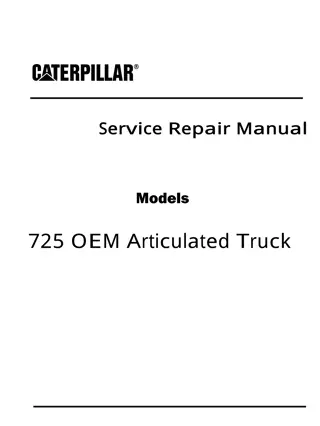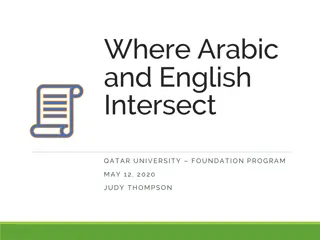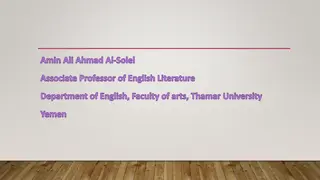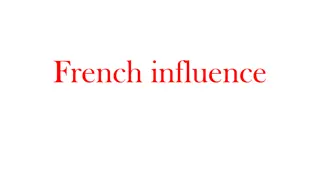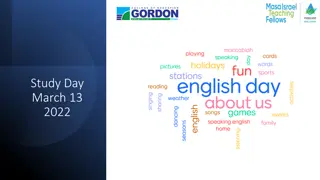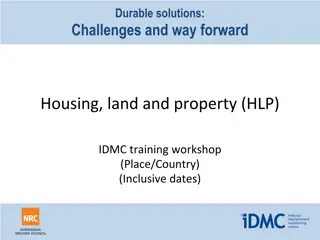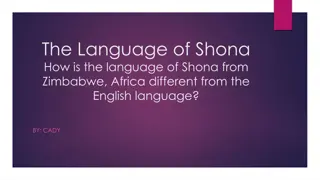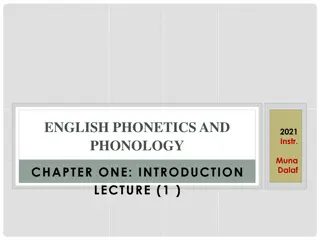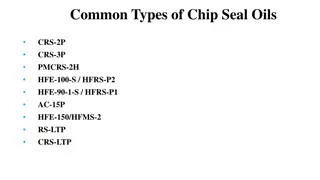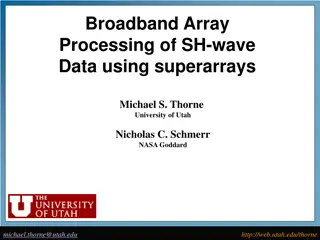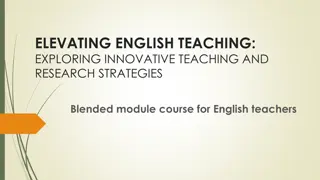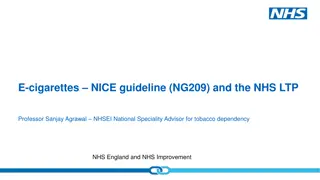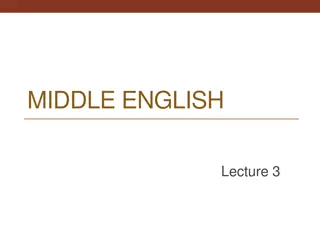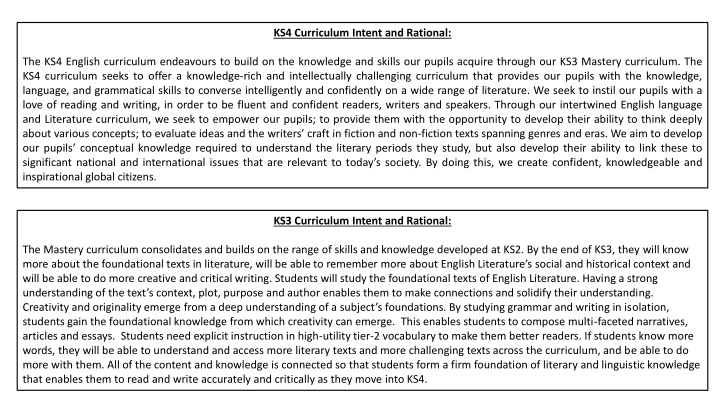
English Literature Curriculum Overview for KS3 and KS4
Explore the comprehensive English Literature curriculum for Key Stage 3 (KS3) and Key Stage 4 (KS4), designed to build essential skills, knowledge, and a love for reading and writing. Discover the progression from foundational texts to advanced literary analysis, fostering critical thinking and fluency in communication.
Download Presentation

Please find below an Image/Link to download the presentation.
The content on the website is provided AS IS for your information and personal use only. It may not be sold, licensed, or shared on other websites without obtaining consent from the author. If you encounter any issues during the download, it is possible that the publisher has removed the file from their server.
You are allowed to download the files provided on this website for personal or commercial use, subject to the condition that they are used lawfully. All files are the property of their respective owners.
The content on the website is provided AS IS for your information and personal use only. It may not be sold, licensed, or shared on other websites without obtaining consent from the author.
E N D
Presentation Transcript
KS4 Curriculum Intent and Rational: The KS4 English curriculum endeavours to build on the knowledge and skills our pupils acquire through our KS3 Mastery curriculum. The KS4 curriculum seeks to offer a knowledge-rich and intellectually challenging curriculum that provides our pupils with the knowledge, language, and grammatical skills to converse intelligently and confidently on a wide range of literature. We seek to instil our pupils with a love of reading and writing, in order to be fluent and confident readers, writers and speakers. Through our intertwined English language and Literature curriculum, we seek to empower our pupils; to provide them with the opportunity to develop their ability to think deeply about various concepts; to evaluate ideas and the writers craft in fiction and non-fiction texts spanning genres and eras. We aim to develop our pupils conceptual knowledge required to understand the literary periods they study, but also develop their ability to link these to significant national and international issues that are relevant to today s society. By doing this, we create confident, knowledgeable and inspirational global citizens. KS3 Curriculum Intent and Rational: The Mastery curriculum consolidates and builds on the range of skills and knowledge developed at KS2. By the end of KS3, they will know more about the foundational texts in literature, will be able to remember more about English Literature s social and historical context and will be able to do more creative and critical writing. Students will study the foundational texts of English Literature. Having a strong understanding of the text s context, plot, purpose and author enables them to make connections and solidify their understanding. Creativity and originality emerge from a deep understanding of a subject s foundations. By studying grammar and writing in isolation, students gain the foundational knowledge from which creativity can emerge. This enables students to compose multi-faceted narratives, articles and essays. Students need explicit instruction in high-utility tier-2 vocabulary to make them better readers. If students know more words, they will be able to understand and access more literary texts and more challenging texts across the curriculum, and be able to do more with them. All of the content and knowledge is connected so that students form a firm foundation of literary and linguistic knowledge that enables them to read and write accurately and critically as they move into KS4.
KS4 English Long-Term Plan 2020-2021 Curriculum Intent and Rational: The KS4 English curriculum endeavours to build on the knowledge and skills our pupils acquire through our KS3 Mastery curriculum,. The KS4 curriculum seeks to offer a knowledge- rich and intellectually challenging curriculum that provides our pupils with the knowledge, language, and grammatical skills to converse intelligently and confidently on a wide range of literature. We seek to instil our pupils with a love of reading and writing, in order to be fluent and confident readers, writers and speakers. Through our intertwined English language and Literature curriculum, we seek to empower our pupils; to provide them with the opportunity to develop their ability to think deeply about various concepts; to evaluate ideas and the writers craft in fiction and non-fiction texts spanning genres and eras. We aim to develop our pupils conceptual knowledge required to understand the literary periods they study, but also develop their ability to link these to significant national and international issues that are relevant to today s society. By doing this, we create confident, knowledgeable and inspirational global citizens. AUTUMN 1 8 weeks AUTUMN 2 7 weeks SPRING 1 6 weeks SPRING 2 6 weeks SUMMER 1 6 weeks SUMMER 2 6 weeks Language P1 Language P2 Language P2 (Section A) Language P1/2 (Section B) Language P1/2 (Section B) Year 11 Language X3 lessons AIC (Lit P2) Macbeth (Lit P1) Macbeth (Lit P1) Jekyll and Hyde (Lit P1) Literature revision Literature x3 lessons (x2 in lesson + x1 p6 intervention) Period 6: Period 6: Period 6: Period 6 Period 6: Misconceptions Misconceptions Unseen Poetry Revision Revision Form(35 mins) Language P2 (Section B) Reading AIC Unseen Poetry booklet Unseen Poetry booklet Language P1 (Section B) AIC Exam Prep Booklet Language P2 (Section B) Macbeth Exam Prep Booklet Language P1 (Section B) Language P1(Section A) Language P1 (Section B) Language P2 (Section A) Language P2 (Section B) Revision and mocks Year 10 Jekyll and Hyde An Inspector Calls X5 lessons Literature X3 Language X2 (interleaved) Macbeth (Lit P1) Macbeth (Lit P1) Poetry (Lit P2 Revision and mocks
KS4- English HLP 2020-2021 Autumn 1/ Spring 2/ Summer 1 Autumn 2/ Spring 2/ Summer 1 Spring 1 Language P2 (Section B) Language P1 (Section B) Language P2 (Section A) 1. What are the requirements of Language Paper 2, Section B? 2. How can exploring the writer s perspective in question 4 support with question 5? 3. What are the requirements to formulating an effective opinion? 4. What does the onion approach consist of and how can you apply this in writing? 5. What is the meaning of register? 6. What are language features? How can these be crafted and seamlessly embedded into a creative piece of writing? 7. What are structural features? How can these be crafted and seamlessly embedded into a creative piece of writing? 8. What are discourse markers and how can these be incorporated into a creative piece of writing? 9. What are the different types of punctuation and how can they be accurately used in writing? 10. What are the different types of sentences and how can they be accurately used in writing? 11. What would be classed as sophisticated/ ambitious vocab and how can these be seamlessly embedded in a piece of transactional writing? 1. What are the requirements of Language Paper 1, Section B? 2. What is the meaning of register? 3. What are language features? How can these be crafted and seamlessly embedded into a creative piece of writing? 4. What are structural features? How can these be crafted and seamlessly embedded into a creative piece of writing? 5. What are discourse markers and how can these be incorporated into a creative piece of writing? 6. What are the different types of punctuation and how can they be accurately used in writing? 7. What are the different types of sentences and how can they be accurately used in writing? 8. What would be classed as sophisticated/ ambitious vocab and how can these be seamlessly embedded in a piece of creative writing? 1. What are the requirements of Language Paper 2, Section A? 2. What are the requirements to successfully identify explicit/implicit information? Can you successfully apply this to an exam question? 3. What are the requirements to inferring and synthesising two different sources? Can you successfully apply this to an exam question? 4. How does the writer use language to describe (focus of the question?) 5. What are the requirements to comparing writers ideas and perspectives, as well as how these are conveyed, across two sources? Can you successfully apply this to an exam question? Year 11: Language
KS4- English HLP 2020-2021 Autumn Term/ Spring 2/Summer 1 AIC (Lit P2) Spring 2/Summer 1 Macbeth 1. What are the requirements of Literature Paper 1? 2. What was life like in the Jacobean period? 3. How does Shakespeare present the witches? Why does he do this? 4. What is stagecraft and how does it impact the opening of the play? 5. How does Shakespeare present Macbeth? Why does he do this? 6. How does Shakespeare present Lady Macbeth? Why does he do this? 7. How does Shakespeare present the supernatural? 8. How does Shakespeare present Banquo? Why does he do this? 9. How does Shakespeare present Macduff? Why does he do this? 10. How does Shakespeare present key themes across the play (ambition, guilt, power, good vs evil, appearance vs reality, gender, kingship, supernatural, religion) and his purpose? 11. How does Shakespeare present and develop the Lady Macbeth s character through language, structure and dramatic devices? 12. How does Shakespeare present and develop the Macbeth s character through language, structure and dramatic devices? 1. 2. 3. 4. 5. What are the foundational components of 'An Inspector Calls' and the exam What are the key contextual issues students need to know before studying 'An Inspector Calls'? What is stagecraft and how does it impact the opening of the play? How does Priestley begin to craft characters and themes to communicate his purpose? How does Priestley weave language and structure together with key contextual issues to create an overarchingunderstanding of Mr. Birling? How does the use of language and structure through Mr. Birling's interaction with the Inspector create a deeper understanding of Priestley's overall purpose? 7. How does Priestley position Sheila to be instrumental in communicating his political stance? 8. How do language, structure and dramatic devices identify the Inspector's role within the play? 9. How does Priestley begin to use the character of Eva Smith to make judgements about the class system and its effects on society? 10. How does Priestley use language and structure to present Gerald as a representation of the divides and injustice within 1912 society? 11. How does Priestley's use of language, structure and dramatic devices present Mrs. Birling as a key root of the inherent flaws within society? 12. How does Priestley develop the Inspector's role through language, structure and dramatic devices? 13. How does Priestley present the change in Sheila to be symbolic of his views about wider society? 14. How does Priestley use the character of Eva to challenge stereotypes held about the working classes? 15. How does Priestley employ the character of Eric to identify inherent flaws within society yet point to the hope for change? 16. How does Priestley use the Inspector as a lens through which to view society and a tool to challenge the audience's political persuasions? 17. How is does Priestley use language and structure to highlight the change within Eric? 18. How does Priestley use Gerald to highlight the struggle against truth and responsibility? 19. How instrumental is Sheila in communicating Priestley's message to the audience? 20. To what extent are Mr. And Mrs. Birling unchanged and thus, representative or and responsible for the flaws in society? 6. Year 11 : Literature
KS4- English HLP 2020-2021 Autumn Term Summer 1/ 2 Summer 2 Macbeth Poetry (P+C) (Lit p2) AIC (Lit P2) 1. What are the requirements of Literature Paper 1? 2. What was life like in the Jacobean period? 3. How does Shakespeare present the witches? Why does he do this? 4. What is stagecraft and how does it impact the opening of the play? 5. How does Shakespeare present Macbeth? Why does he do this? 6. How does Shakespeare present Lady Macbeth? Why does he do this? 7. How does Shakespeare present the supernatural? 8. How does Shakespeare present Banquo? Why does he do this? 9. How does Shakespeare present Macduff? Why does he do this? Why does he do this? 10. How does Shakespeare present the supernatural? 1. What are the requirements of Literature Paper 2? (P+C poetry only) 2. How does the context influence the poet s purpose? 3. How does the poet use language to achieve their purpose? 4. How does the poet use structure to achieve their purpose? 5. How does the poet use form to achieve their purpose? 6. How is the power of nature presented across: Ozymandias, Exposure, Storm on The Island and The Prelude. 1. What are the requirements of Literature Paper 2? (AIC question only) 2. What was life like in the Edwardian period? 3. What is stagecraft and how does it impact the opening of the play? 4. How does Priestley present Mr Birling s character? Why does he do this? 5. How does Priestley present Mrs Birling s character? Why does he do this? 6. How does Priestley present Gerald s character? Why does he do this? 7. How does Priestley present Sheila s character? Why does he do this? 8. How does Priestley present Eric s character? Why does he do this? 9. How does Priestley present Eva Smith s character? Why does he do this? 10. How does Priestley present the inspector s character? Why does he do this? Year 10 : Literature
KS4- English HLP 2020-2021 Autumn Autumn / Spring Spring / Summer Summer Language P1 (Section A) Language P1 (Section B) Language P2 (Section A) Language P2 (Section B) 1. What are the requirements to successfully identify explicit/implicit information? Can you successfully apply this to an exam question? 2. How does the writer (Shakespeare) use language to describe (focus of the question? Character/ theme from Macbeth). 3. How does the Shakespeare structure the text to interest the audience? 4. What are the requirements to successfully evaluate a statement? Can you successfully apply this to an exam question? 1. What are the requirements of Language Paper 1, Section B? 2. What is the meaning of register? 3. What are language features? How can these be crafted and seamlessly embedded into a creative piece of writing? 4. What are structural features? How can these be crafted and seamlessly embedded into a creative piece of writing? 5. What are discourse markers and how can these be incorporated into a creative piece of writing? 6. What are the different types of punctuation and how can they be accurately used in writing? 7. What are the different types of sentences and how can they be accurately used in writing? 1. What are the requirements of Language Paper 2, Section A? 2. What are the requirements to successfully identify explicit/implicit information? Can you successfully apply this to an exam question? 3. What are the requirements to inferring and synthesising two different sources? Can you successfully apply this to an exam question? 4. How does the writer use language to describe (focus of the question?) 5. What are the requirements to comparing writers ideas and perspectives, as well as how these are conveyed, across two? Can you successfully apply this to an exam question? 1. What are the requirements of Language Paper 2, Section B? 2. How can exploring the writer s perspective in question 4 support with question 5? 3. What are the requirements to formulating an effective opinion? 4. What does the onion approach consist of and how can you apply this in writing? 5. What is the meaning of register? 6. What are language features? How can these be crafted and seamlessly embedded into a creative piece of writing? 7. What are structural features? How can these be crafted and seamlessly embedded into a creative piece of writing? 8. What are discourse markers and how can these be incorporated into a creative piece of writing? 9. What are the different types of punctuation and how can they be accurately used in writing? 10. What are the different types of sentences and how can they be accurately used in writing? Year 10: Language
English Long-Term Plan 2020-2021 KS3 Curriculum Intent and Rational: The Willenhall E-Act Academy English team recognise that that study of English is not only the underpinning to student success across all curricular, but is the secret to accomplishment in wider life. By nurturing skills in reading, writing, orating and divergent thinking, we value our subject as being at the heart of understanding the world and the voices within it, both past and present. The complexity and intricacies of English grammar are taught explicitly through our mastery programme so that with firm foundational knowledge, students question and explore how language works. From this understanding, creativity can emerge, equipping students with the necessary skills to read and compose, multi-faceted narratives, articles and essays. In English Literature, we seek to develop students ability to think deeply about humanity, to delve into the psyche of great writers, exploring their perspectives in order to walk around in their shoes and broaden their own perspectives. Regular exposure to a wide range of the finest fiction and non-fiction texts ensures a curriculum that far extends what is examinable to equip students with the practical, creative and analytical approaches to better understand the world around them. AUTUMN 1 AUTUMN 2 SPRING 1 SPRING 2 SUMMER 1 SUMMER 2 Jane Eyre x 3 lessons per week Animal Farm Poetry x 3 lessons per week Reading for Study x 1 lesson per week Mastery Writing x 2 lessons per fortnight Reading for Study (Mastery Writing) x4 lessons per week Romeo & Juliet x 3 lessons per week Reading for Study x 1 lesson per week Reading for Pleasure x 1 lesson per fortnight Year 9 Reading for Pleasure x 1 lesson per fortnight The Tempest s x 2 lessons per week Poetry x2 lessons per week Animal Farm The Tempest x 3 lessons per week The Adventures of Sherlock Holmes x 3 lessons per week Mastery Writing x 2 lessons per fortnight Reading for Pleasure x 1 lesson per fortnight Year 8 Mastery Writing x 1 lesson Mastery Writing Grammar Descriptive Writing x2 lessons per week Danny The Champion of the World x2 lessons Danny The Champion of the World x2 lessons per week A Midsummer Night s Dream x 3 lessons per week Mastery Writing x 2 lessons per fortnight Reading for Pleasure x 1 lesson per fortnight Oliver Twist x 3 lessons per week Mastery Writing x 2 lessons per fortnight Reading for Pleasure x 1 lesson per fortnight Mastery Writing x1 lesson per week Year 7 Mastery Writing x2 lessons per week Library lesson x1 per week
KS3 Year 9 - English HLP 2020-2021 Autumn Term Spring Term Summer Term Mastery Writing 4 (lessons 1-20) How can I enhance understanding with subordinate clauses? Year 9 Traditional How can I avoid common grammatical mistakes? Shakespeare - Romeo & Juliet Reading for Study Reading for Study Victorian Literature - Jane Eyre Poetry Comparing poems How do I structure a thesis? How do I use punctuation for effect? What is the form of a tragedy and a tragic hero? How do we see religious ideas through literature? How do I build an effective narrative? How do we understand extended metaphors? How can I develop and sustain ideas across a text? How is structure used for effect? How can I use the past, present and future tense effectively? How do we compare poems? Mastery Writing 3 (Lessons 1-20) How is structure used effectively? Can I understand how society changes over time? How can I develop the use of prepositional phrases and temporal clauses? How does the context influence our understanding of poetry? What are relative clauses and how do we use them effectively? How are Shakespearian characters developed and sustained? How can I effectively explore language? Year 9 Foundation Can I show understanding of complex sentences and independent clauses? Can I write for different genres? N.B. Students may study Mastery Writing 3 or 4 alongside Reading for Study in place of the Reading for Pleasure unit
KS3 Year 8 - English HLP 2020-2021 Autumn Term Spring Term Summer Term Mastery Writing 3 (Lessons 1-20) Mastery Writing 3 (Lessons 21 -32) Mastery Writing 3 (Lessons 33 -45) How can I develop the use of prepositional phrases and temporal clauses? How are different perspectives created? Can I identify and use apostrophes accurately? Year 8 Traditional How do I avoid common grammatical mistakes? How do I enhance understanding with subordinate clauses? Victorian Literature - The Adventures of Sherlock Holmes Modern Texts - Animal Farm Shakespeare - The Tempest Can I show understanding of complex sentences and independent clauses? How do I structure different types of fictional narratives? How can I develop and sustain ideas across a narrative? Can I explain how the events of a play link to contextual ideas? Can I explain an allegory and how it is used? How did society change throughout the Victorian period? Can I write for different genres? Can I explore key elements of Shakespearean plays? How do we see the Russian revolution within the novella? How do characters illustrate the class system? Mastery Writing 2 (Lessons 1-20) Mastery Writing 2 (lessons 21-35) Mastery Writing 2 (lessons 36-50) Can I complete a closed book analysis? How are irony and imagery used for effect? Can I identify key features of a genre within a novel? How can I create effective descriptions in my writing? Can I punctuate dialogue accurately? What are temporal clauses and why are they used? Year 8 Foundation How are narrative structures used effectively? Can I write using a clear subject/verb agreement? Can I avoid and correct fragments? What are prepositional phrases and why are they used? Can I identify errors and correct them? How are paragraphs structured effectively?
KS3 Year 7 - English HLP 2020-2021 Autumn Term Spring Term Summer Term 1 & Summer Term 2 Mastery Writing 2 (Lessons 1-20) Mastery Writing 2 (lessons 21-35) Mastery Writing 2 (lessons 36-50) How can I create effective descriptions in my writing? Can I punctuate dialogue accurately? What are temporal clauses and why are they used? Ancient Tales Year 7 Traditional How are narrative structures used effectively? Can I define a moral and identify the morals in each Ancient Tale? Can I avoid and correct fragments? Poetry language and structure Shakespeare - A Midsummer Night s Dream Victorian Literature - Oliver Twist Can I write using a clear subject/verb agreement? What are prepositional phrases and why are they used? Can I identify errors and correct them? Can I explain how poems are structures? Can I explain what each Ancient Tale teaches its audience and relate it to its cultural traditions? How are paragraphs structured effectively? Can I explain what life was like in Victorian London? Can I explain what life was like in Elizabethan England? Can I define a metaphor? How are characters developed? Mastery Writing 1 (lessons 1-20) Mastery Writing 1 (lessons 21-30) Mastery Writing 2 (lessons 1-10) Can I identify key themes or ideas within a play? How are metaphors used effectively? How are key themes presented? Can I write accurately in the past simple tense? How can I write accurate story openings? How can I create effective descriptions in my writing? How does a playwright structure a play? Can I explore the features of poetic forms? Can I confidently perform my own version of one of the Ancient Tale stories? Year 7 Foundation Can I identify the correct subjects and verbs in sentences? How do I avoid and correct fused sentences? Can I write using a clear subject/verb agreement? Can I construct clear and accurate sentences? Can I identify word classes and use them correctly in my writing? How are paragraphs structured effectively?





